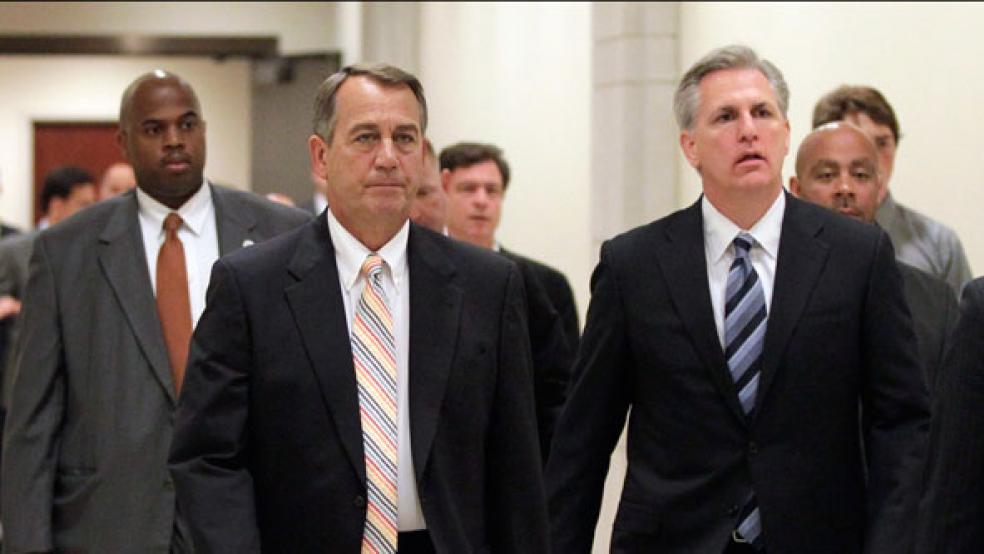Disputing media reports, House Speaker John Boehner, R-Ohio., told reporters Friday morning that he and President Obama remain far apart from an agreement on a deficit reduction deal that would stave off the first U.S. government default.
“There was no agreement, publicly, privately, never an agreement and frankly not close to an agreement,” Boehner said. “I would just suggest that it’s going to be a hot weekend here in Washington, D.C.” News organizations reported Thursday that Obama and Boehner were discussing $3 trillion in deficit reduction, relying almost exclusively on cuts in spending and entitlement programs and with no immediate revenue increase. At the same time, Boehner suggested that budget negotiations were still ongoing. “I’ve talked with the White House about keeping the line of communication open,” he said.
Speaking at a town hall meeting at the University of Maryland, College Park Friday morning, Obama insisted deficit reduction plan must include new taxes as well as unpalatable spending cuts, and he urged Republicans to compromise on a deal. “The only people we have left to convince are some folks in the House of Representatives and we're going to keep working on that,” he said.
House Republicans are adamant in opposing higher tax revenues as part of any deal, arguing that they would hurt the economy. Many Democrats in both chambers fear that Obama will bend to Republican demands and sign off on a plan with no short term tax increases – just the promise of long term tax code reforms that might generate increased revenue in the long term.
Obama met Thursday evening with top Democratic congressional leaders for two hours at the White House to discuss the status of the debt talks. There were no plans for Obama and Republican leaders to are no scheduled meetings with the president and Republicans leaders as of Friday afternoon.
Boehner’s comments came shortly before the Senate rejected the House-passed “Cut, Cap and Balance” bill by a vote of 51 to 46. The measure, including a proposed constitutional Balanced Budget Amendment, was dismissed by Senate Democrts as a political statement more than serious legislation. Senate Majority Leader Harry Reid, D-N.V., said the “Cut, Cap and Balance” bill is “over, it’s done, it’s dead.”
The House measure would have raised the debt ceiling by $2.4 trillion, while sharply cutting and capping government spending, but not raising taxes to help reduce the deficit. “When is Harry Reid going to put forward his ideas?” said House Leader Eric Cantor of Virginia.
The Senate was scheduled to meet in emergency session over the weekend, but Reid cancelled the session while on Obama, Boehner and other top leaders continued to try to hammer out deal.
There are 11 days remaining before the Treasury says it will exhaust its borrowing authority and the government will have insuffient funds to pay its creditors and cover all other government obligations. The administration, Federal Reserve, and many financial experts warn that a first ever government default could have catastrophic effects on the economy and markets, but many Republicans argue that the government could temporarily muddle through even if it has to prioritize spending and leave some bills unpaid for a while.
Obama and Boehner have reportedly discussed a deficit reduction deal totaling $3 trillion over the coming decade, with deep cuts in government agency and entitlement spending, but no immediate increases in revenues. About 90 House Republicans said they would oppose a fallback proposal originally floated by Senate Minority Leader Mitch McConnell, R-Ky., which would authorize the president to raise the debt ceiling in three separate increments over 18 months, without congressional approval. The plan, refined by Reid, also calls for spending cuts of up to $1.5 trillion, as well as creation of a congressional committee responsible for recommending other major savings.
Meanwhile, negotiators are trying to incorporate pieces of the “Gang of Six” proposal into a final deal. That plan, introduced on Wednesday by six Republican and Democratic senators who have been meeting, off and on, for months, would reduce the deficit by $3.7 trillion over 10 years.
Even if Obama and Boehner reach agreement, they will have to sell it to the House and the Senate, and given deep divisions in both parties, that will be a tough sell. Any agreement will be taken up first by the House and then the Senate, according to Rep. Rob Andrews, D-N.J.. “I think what is likely is a deal that has a short-term and a long-term component, with the condition upon passage of a reconciliation,” he told reporters. Congress will have to pass major budget legislation to reconcile all the provisions of any final deal, a complicated and time-consuming process. “We all know it’s impossible to write a reconciliation bill between now and August 2.”





